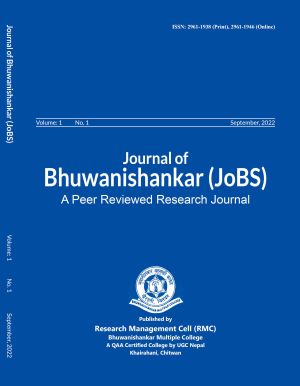Effectiveness of Instruction with Manipulative Materials on Fourth Graders’ Geometry Learning Achievement
DOI:
https://doi.org/10.3126/jobs.v1i1.49495Keywords:
experimental group, intervention, maipulative, t-test, post-testAbstract
The concepts of geometrical figures, shape, and size are essential for learning their features, relations, and proofs. In the geometry classroom, a good teacher is expected to use the objects related to geometrical shapes for the real concept and knowledge of the figures, and to improve the learning achievement of young learners. In this context, this study aimed to compare the learning achievements obtained from using and without using manipulative materials in teaching geometry, especially in grade four, and identify students' general attitudes and feelings towards the instruction with the demonstration of the concrete objects. For this purpose, the researcher employed the Basic Experimental and Post-test Only Control Group Design to form two groups, the Experimental Group and the Control Group, having a similar level of prior knowledge and competence in geometry. Each group consisted of 13 students studying in grade four at Kapiya Secondary School, Khairahani, Chitwan, Nepal. The same achievement test was conducted for both groups after a month's intervention. The t-test was used to draw the significant deviation between the achievements. The result showed that the mean achievement of the learners who were instructed through manipulative objects was better than the achievement of the learners instructed without using them. After the test, some students from the Experimental Group were chosen for the interview to uncover their perceptions before and after the intervention. It revealed that students enjoyed the class based on learning with the manipulation of concrete objects. The study guides the mathematics teachers teaching junior classes to involve the students in the manipulation of different types of materials in geometry activities for the real concept of geometry and enhancement of learning achievement.
Downloads
Downloads
Published
How to Cite
Issue
Section
License
Copyright (c) 2022 RMC, Bhuwanishankar Multiple College

This work is licensed under a Creative Commons Attribution-NonCommercial-ShareAlike 4.0 International License.
This license allows reusers to distribute, remix, adapt, and build upon the material in any medium or format for noncommercial purposes only, and only so long as attribution is given to the creator. If you remix, adapt, or build upon the material, you must license the modified material under identical terms.




